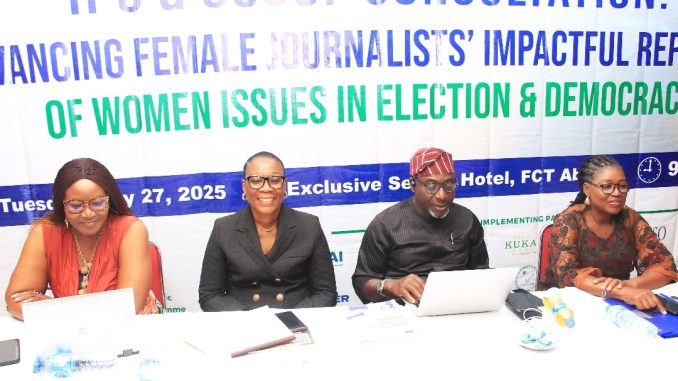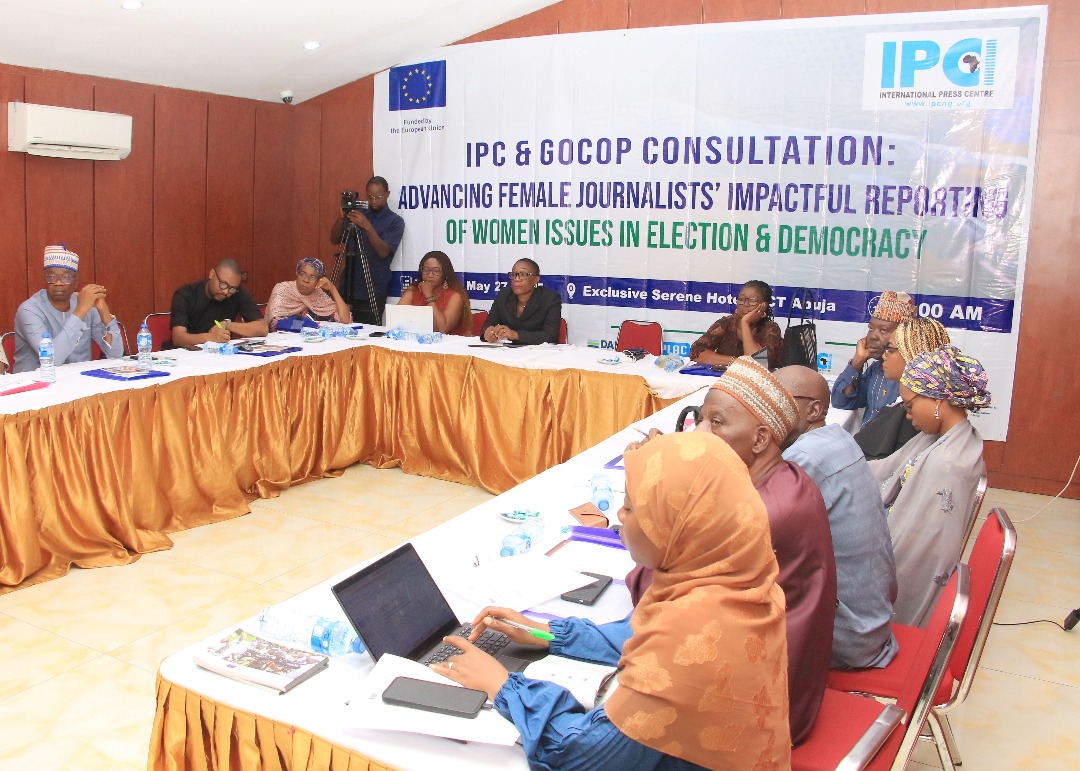
By Bukola Kayode
The Guild of Corporate Online Publishers (GOCOP) and the International Press Centre (IPC) have committed to improving accountability on women-focused campaign promises and the overall media presence of women in politics.
The need for the collaboration between GOCOP and a credible stakeholder such as the IPC, to significantly improve the quality and frequency of reportage of women involved in the electoral process, formed part of the communique issued at the end of a one-day Consultative Meeting On Advancing Gender Issues In Nigeria’s Electoral and Democratic Process, held in Abuja on Tuesday.
The communique was signed by Mr. Lanre Arogundade, Executive Director, IPC and Maureen Chigbo, President, GOCOP.
…….Key findings and challenges identified
Participants which included GOCOP leadership and a senior editor from a national daily made certain observations following the delivery of keynote paper, by the Executive Director, Illuminate Nigeria Development Network, Ms. Anikeade Funke-Treasure, titled, “Utilizing Media Power to Promote Electoral Outcomes and Reforms Addressing Women’s Issues: A Roadmap for GOCOP/Journalists.”

Participants observed that little attention is paid to women’s issues in most national electoral dialogues with grassroots women particularly being denied of voice and representation.
They also concurred that media coverage of women in politics and women aspiring to enter politics is still low, this is even as the high cost of obtaining forms to vie for offices from the political parties and campaigns for elective positions has made it almost impossible for many women politicians to participate.
Majority of the statements from participants also showed that social and cultural practices and beliefs in some parts of the country continue to constitute obstacles to women’s full participation in political and electoral activities.
Also a critical issue is that fact that in many parts of the country, women who dare to participate in politics, especially in elections for public office, are derided or viewed as “loose” or being too forward by society itself, thereby discouraging their participation.
Participants expressed worry that the modest achievements of female politicians in the past elections, have been eroded, with women’s representation declining by 19% in the current dispensation, leaving only 3% in the Senate and 4% in the House of Representatives.
……Way Forward
The jointly signed communique highlighted implementable means of addressing the challenges faced by women in participatory democracy and the negative factors militating against women’s participation in politics, especially in elective positions.
The communique read: “ GOCOP and its members should utilize their power to promote and spotlight the electoral issues, fortunes and outcomes of women, change their narrative, and make their platforms available for women’s visibility in the nation’s electoral processes.
“GOCOP and its members should play a lead role in the renewed campaign for women to participate fully in the electoral arena by highlighting the achievements of the few in elective positions and identifying and amplifying the voices of others still in the background
“In a specific attempt to bolster women’s participation in politics, the capacity of those already in elective positions should be enhanced so they can be knowledgeable, capable, and strong enough to serve as models for upcoming female politicians”.
The communique also urged that GOCOP’s 120 members create special sections for women-focused content on their platforms and establish a partnership framework with IPC that generates content and information on women’s political participation while continuously highlighting the challenges facing female political actors.
The communique further recommended that IPC/GOCOP should within a short period begin a series of interactive sessions with elected female legislators starting with Kwara State for dialogues that would elicit information that can be publicly projected as models for other states and also for appreciation of women contributions in the democratic space.
“ IPC and GOCOP working with other media interest groups like the Nigeria Women Association of Journalists (NAWOJ) should facilitate interactive sessions with community and religious leaders and other relevant stakeholders to sensitize them about the importance of encouraging women to enter politics”, the communique said.
The meeting was supported by the European Union through the European Union Support to Democratic Governance in Nigeria (EU-SDGNII) programme, spanning five key components including support to INEC, the National Assembly and Judiciary, political parties, civil society, and the media with the aim of promoting pluralistic, inclusive, and participatory democracy in Nigeria.
IPC is the lead partner for Component 4: Support to Media, being implemented with the Centre for Media and Society (CEMESO).
*COMMUNIQUE OF A ONE-DAY CONSULTATIVE MEETING ON ADVANCING INCLUSIVE REPORTING OF GENDER ISSUES IN NIGERIA’S ELECTORAL AND DEMOCRATIC PROCESSES HELD IN ABUJA, FCT ON TUESDAY MAY 27, 2025.*
The Consultative meeting was held on Tuesday, May 27, 2025, at the Exclusive Serene Hotel, Wuye District of the Federal Capital Territory (FCT), Abuja, Nigeria as part of a serial engagement between the International Press Centre (IPC) and the Guild of Corporate Online Publishers (GOCOP) with the overarching objective of professionally empowering women journalists in particular, and Online media practitioners in general, for the purpose of elevating women’s voices in Nigeria’s political landscape and ensuring democratic accountability for women-focused campaign promises.
The meeting was supported by the European Union through the European Union Support to Democratic Governance in Nigeria (EU-SDGNII) programme, spanning five key components including support to INEC, the National Assembly and Judiciary, political parties, civil society, and the media with the aim of promoting pluralistic, inclusive, and participatory democracy in Nigeria. IPC is the lead partner for Component 4: Support to Media, being implemented with the Centre for Media and Society (CEMESO).
The meeting was attended by the national leadership of GOCOP, online publishers and at least a media manager from the Print media.
*Opening statements and presentation*
The GOCOP President, Maureen Chigbo, in her opening remarks set the tone and direction of the discourse by urging participants to develop actionable plans to effectively mainstream women electoral issues in the media and to boost positive electoral outcomes for female politicians.
The IPC Executive Director, Lanre Arogundade in his own welcome remarks provided a brief overview of the female-focused programme activities of IPC being supported by the European Union explaining that the expectation is that GOCOP and its members would not only commit to upscaling the coverage and reportage of women electoral and democratic issues but also provide the enabling environment for their journalists to investigate and report the issues in-depth for visible results.
In her lead presentation, the keynote paper, the Executive Director, Illuminate Nigeria Development Network, Ms. Anikeade Funke-Treasure, spoke on “Utilizing Media Power to Promote Electoral Outcomes and Reforms Addressing Women’s Issues: A Roadmap for GOCOP/Journalists.” She charged GOCOP and its members to adopt deliberate and positively disruptive measures to change the narrative about women’s electoral issues and political issues through intense reporting and advocacy in support of reforms and policies that would enhance women representation. She also made a point about the viability of female candidates for appointive and elective offices, stressing that the media should intentionally and proactively support the viability of women politicians as well as their continued visibility.
*Key findings and challenges identified*
Following the opening statements and lead presentation, the participants made the following observations:
1) There is a disturbing poor attention to women’s issues in most national electoral dialogues with grassroots women particularly being denied of voice and representation;
2) Media coverage of women in politics and women aspiring to enter politics is still low;
3) The unusually high cost of obtaining forms to vie for offices from the political parties and campaigns for elective positions has made it almost impossible for many women politicians to participate;
4) Social and cultural practices and beliefs in some parts of the country continue to constitute obstacles to women’s full participation in political and electoral activities;
5) Due to patriarchal and societal biases, many women lack the courage to showcase themselves in open campaigns or press interviews. Those who do often require permission from male figures—sponsors, husbands, or parents.
6) In many parts of the country, women who want to participate in politics, especially in elections for any positions, are derided or viewed as “loose” or being too forward by society itself, thereby discouraging their participation.
7) The modest achievements of the past have therefore been eroded, with women’s representation declining by 19% in the current dispensation, leaving only 3% in the Senate and 4% in the House of Representatives.
8) However, the high level of women representation in State like Kwara and Ekiti is commendable and encouraging while it is disappointing that some states do not have women elected representatives at all.
*Resolutions:*
After a thorough analysis of the challenges faced by women in participatory democracy and the negative factors militating against women’s participation in politics, especially in elective positions, the consultative meeting resolved as follows:
1) GOCOP and its members should utilize their power to promote and spotlight the electoral issues, fortunes and outcomes of women, change their narrative, and make their platforms available for women’s visibility in the nation’s electoral processes;
2) GOCOP and its members should play a lead role in the renewed campaign for women to participate fully in the electoral arena by highlighting the achievements of the few in elective positions and identifying and amplifying the voices of others still in the background;
3) In a specific attempt to bolster women’s participation in politics, the capacity of those already in elective positions should be enhanced so they can be knowledgeable, capable, and strong enough to serve as models for upcoming female politicians;
4) IPC/GOCOP should within a short period begin a series of interactive sessions with elected female legislators starting with Kwara State for dialogues that would elicit information that can be publicly projected as models for other states and also for appreciation of women contributions in the democratic space;
5) IPC and GOCOP working with other media interest groups like the Nigeria Women Association of Journalists (NAWOJ) should facilitate interactive sessions with community and religious leaders and other relevant stakeholders to sensitize them about the importance of encouraging women to enter politics.
6) GOCOP’s 120 members should create special sections for women-focused contents on their platforms and establish a partnership framework with IPC that generates content and information on women’s political participation while continuously highlighting the challenges facing female political actors.
7) GOCOP members should through their platforms promote advocacy for the fulfillment of the global 35 percent affirmative action target for women at the Federal, State and local levels;
8) GOCOP should support policy and legislative measures to reduce the burden of campaign finance on women while tabling the same issue before political parties;
9) GOCOP should encourage online journalists to continue to enhance their skills on inclusive reporting by availing themselves the opportunity of the virtual training platform to be established by IPC and CEMESO under component 4: Support to media of EU-SDGNII programme.
Signed:
Lanre Arogundade
Executive Director,
International Press Centre (IPC)
Maureen Chigbo
President, GOCOP






Be the first to comment